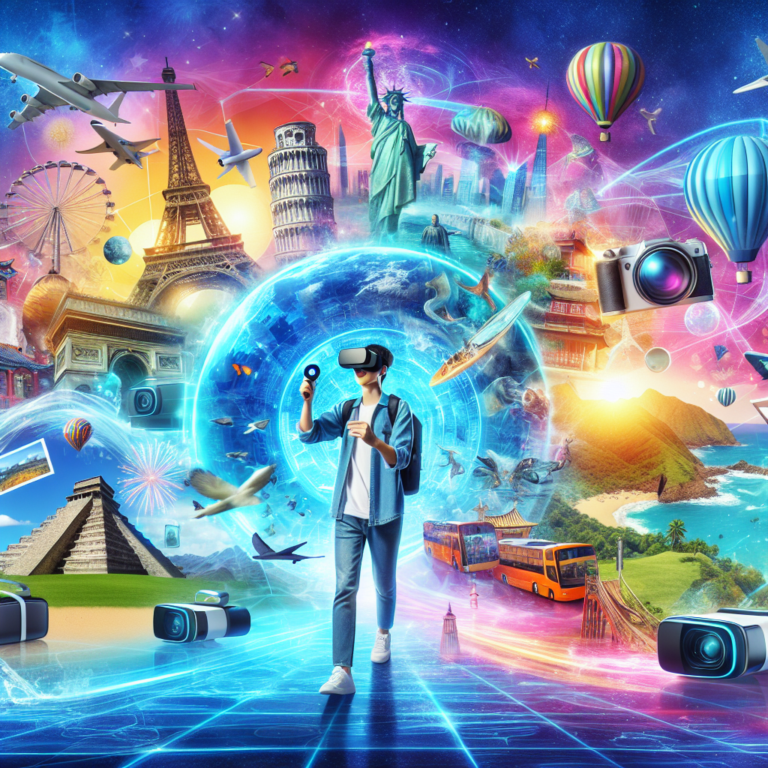The Future of Travel: How Virtual Reality Is Taking Us on a Journey Beyond Borders 🌍
Revolutionizing Exploration Through Virtual Reality
Virtual Reality (VR) is no longer just a concept reserved for gaming and entertainment. It is actively transforming the travel industry, allowing enthusiasts to experience destinations in unprecedented ways. With VR, travelers can indulge in immersive experiences before, during, and after their journeys, effectively blending the desire for exploration with cutting-edge technology.
How VR Elevates the Travel Experience
The integration of VR in travel is diverse, and its applications are expanding rapidly. Here are some exciting ways VR is being implemented:
- Virtual Destination Tours: Travelers can explore landmarks, monuments, and lesser-known gems without ever leaving their homes. Imagine strolling through the streets of Paris or standing in front of the Great Wall of China, all from your living room!
- Pre-Trip Planning: VR enables potential travelers to preview accommodations, attractions, and locales, helping them make informed decisions before booking their adventures.
- Immersive Marketing: Travel companies are leveraging VR for marketing purposes, providing potential clients with vivid experiences that spark curiosity and wanderlust.
- In-Flight Entertainment: Airlines are incorporating VR into their entertainment systems, allowing flyers to escape into different worlds while in transit.
The Tech Behind the Immersion
Creating these captivating VR experiences requires sophisticated technology. The following components are essential for developing engaging VR content in the travel sector:
- VR Headsets: High-quality headsets offer a realistic perception of the virtual environment, immersing users fully.
- 360-Degree Cameras: These cameras capture stunning vistas and allow content creators to share immersive experiences of various destinations.
- VR Development Platforms: Tools like Unity and Unreal Engine enable developers to create captivating travel experiences.
- 3D Modeling and Animation Tools: These tools help bring destinations alive through visually appealing graphics and engaging storytelling.
Innovative Examples of VR in Travel
Several companies are pioneering the use of VR in the travel industry:
- Marriott’s Teleporter: This unique initiative allows visitors to experience different rooms in various locations through a fully immersive VR setup.
- Airbnb’s 360 Experiences: Airbnb has developed 360-degree video content, providing potential guests with a complete look at accommodations and local experiences.
- Google Earth VR: This groundbreaking platform opens up the world, letting users explore anything from bustling cities to serene landscapes—all from their homes.
The Future of VR in Travel: A Glimpse Ahead 🌟
The possibilities for VR in travel are virtually limitless! Here are some predictions about how VR technology might shape future experiences:
- Haptic Feedback: Imagine feeling the heat of a tropical sun or the coolness of a mountain breeze while experiencing virtual environments!
- Language Translation: VR could integrate real-time language translation, making communication seamless during virtual interactions.
- Collaborative Travel Planning: Friends and family could use VR environments to research potential trips together, enhancing the planning process.
- Augmented Reality Integration: The fusion of VR and AR could lead to even more immersive travel experiences, turning real-world interactions into augmented adventures.
The Rise of Virtual Tourism
As the travel landscape evolves, virtual tourism is paving the way for exploration without borders. This trend has gained momentum, especially during the COVID-19 pandemic, offering travelers safe alternatives to traditional travel.
- Technological Advancements: The continuous improvement of VR, AR, and mixed reality (MR) opens the door to more engaging travel experiences.
- Sustainable Travel Demand: With growing concerns about travel’s ecological impact, virtual tourism offers a greener alternative to traditional tourism.
- Accessibility for All: Virtual travel experiences break geographical and financial barriers, enabling everyone to explore the world.
Platforms like Google’s Arts & Culture and Rendezverse offer immersive experiences that allow users to wander through museums, historical sites, and cultural landmarks at their own pace and comfort.
How Technology is Reshaping Travel Planning
The disruption of travel technology extends beyond VR. The evolution of travel tech involves several exciting components:
- Mobile Technology: With a few taps on a phone, travelers can book flights, find accommodations, and navigate through unfamiliar cities.
- Personalization: Companies utilize data analytics to tailor experiences to individual preferences, from customized itineraries to targeted marketing.
- AI and Chatbots: These tools have revolutionized customer service, providing instant responses and enhancing trip planning efficiency.
- Blockchain Innovations: Enhanced security and transparency in transactions provide travelers with peace of mind.
- Smart Travel Gadgets: Innovative devices powered by the Internet of Things (IoT) streamline the travel experience.
Looking Towards Tomorrow: Trends in Travel Tech 🔮
As the world progresses, several trends emerge that will significantly reshape the travel industry:
- Contactless Technologies: Biometrics and travel health tech are becoming standard safety measures, leading to a seamless travel experience.
- Sustainable Travel Solutions: Technology is driving eco-friendly initiatives within the industry, enabling responsible choices.
- Smart Destinations: The use of data analytics will improve tourist experiences by enhancing destination management.
- Rise of Remote Work: The digital nomad lifestyle is changing how people travel, with technology making remote work easier than ever.
- Space Tourism: Companies like SpaceX and Blue Origin are working toward making space accessible for civilian exploration.
Embracing the Transformative Power of Immersive Technologies
As we navigate through advancements in immersive technologies, such as VR and AR, we witness the potential to revolutionize various aspects of life:
- Education: VR brings engaging learning experiences to classrooms, making education accessible and interactive.
- Healthcare: Training simulations and remote consultations enhance patient care and outcomes.
- Social Interaction: Immersive tech fosters connections, bridging distances, and making conversations feel more personal.
- Creativity and Innovation: The blending of art and technology creates endless possibilities for expression and creativity.
With the world continuously evolving, the travel industry is set to embark on an exhilarating journey fueled by technological advancements. Embrace the possibilities of virtual reality, as it opens doors to unprecedented adventures, all from the comfort of your home! 🌐✨




0 Comments